Management Accounting Report for Thirdway Group: Unit 5, CCL-019-023
VerifiedAdded on 2021/02/19
|17
|5943
|49
Report
AI Summary
This report provides a detailed analysis of management accounting, focusing on the Thirdway Group Plc. It begins by defining management accounting, its systems (inventory management, cost accounting, price optimization, and job costing), and the differences between management and financial accounting. The report then explores methods of management accounting reporting, including budget reports, performance reports, accounts receivable reports, and inventory management reports. It highlights the benefits of a management accounting system, such as improved efficiency and decision-making, while also acknowledging potential disadvantages like cost and time investment. The report further examines cost analysis techniques, including absorption and marginal costing, and different planning tools for budgetary control. Finally, it addresses adapting management accounting systems to respond to financial problems, offering insights into integrating these systems with accounting reports and their overall role in organizational management.
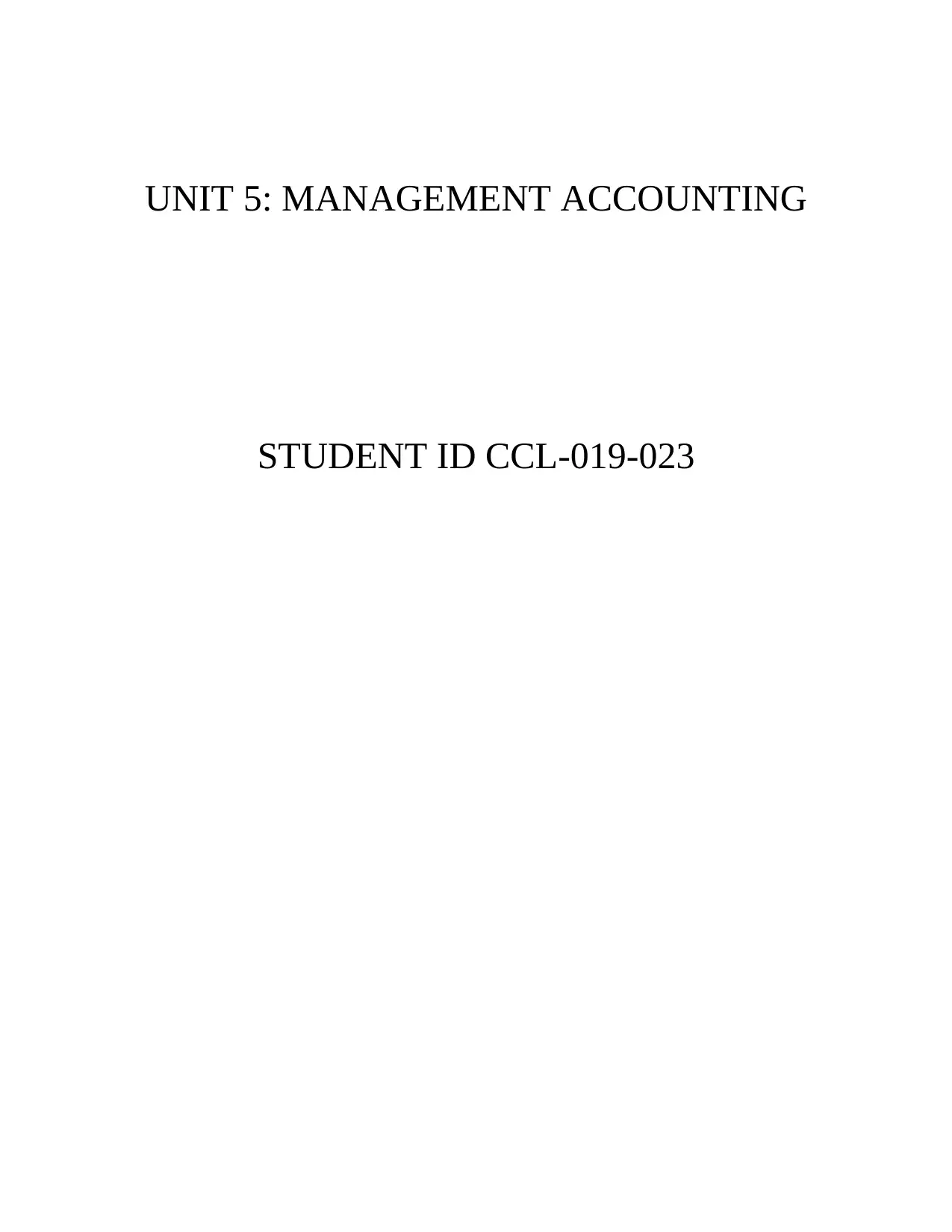
UNIT 5: MANAGEMENT ACCOUNTING
STUDENT ID CCL-019-023
STUDENT ID CCL-019-023
Paraphrase This Document
Need a fresh take? Get an instant paraphrase of this document with our AI Paraphraser
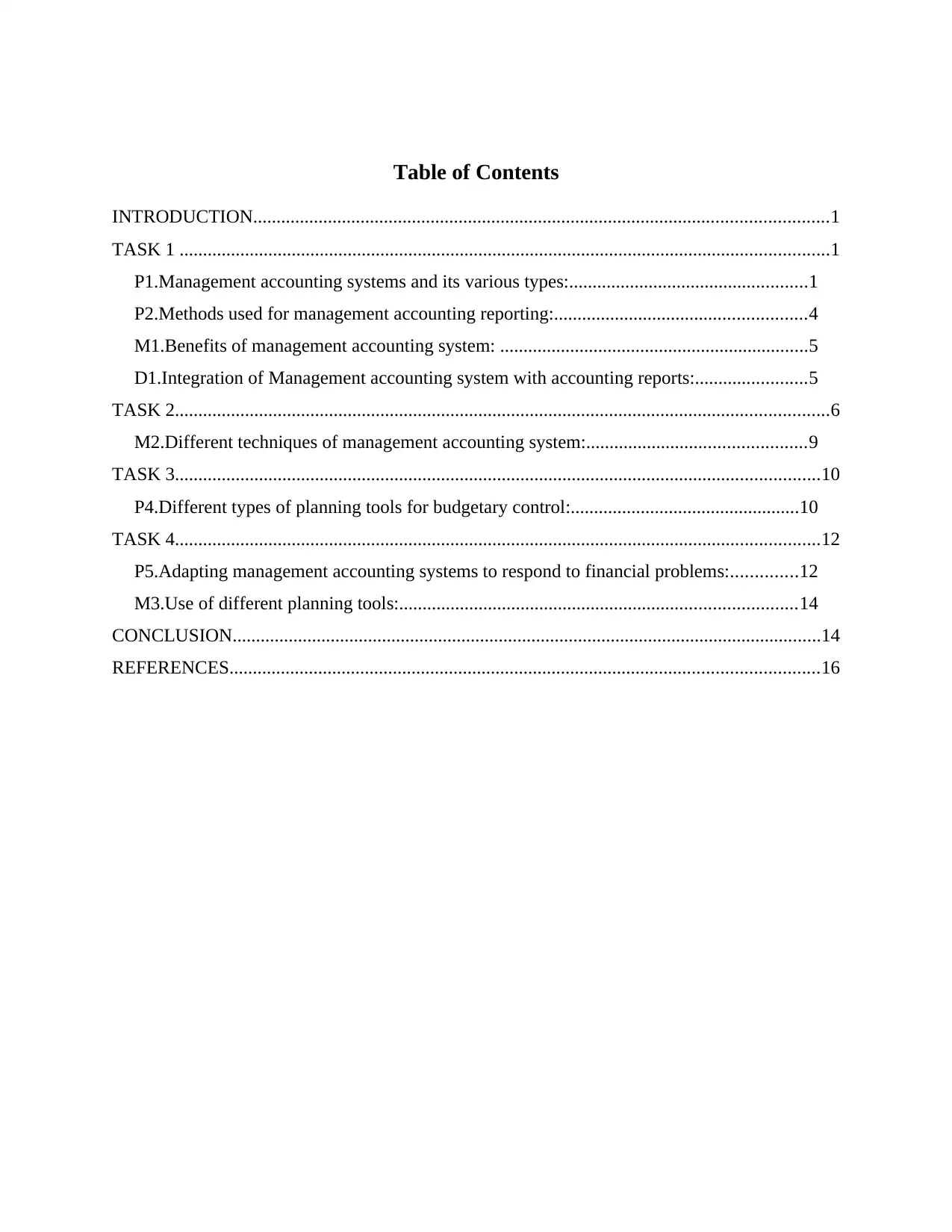
Table of Contents
INTRODUCTION...........................................................................................................................1
TASK 1 ...........................................................................................................................................1
P1.Management accounting systems and its various types:...................................................1
P2.Methods used for management accounting reporting:......................................................4
M1.Benefits of management accounting system: ..................................................................5
D1.Integration of Management accounting system with accounting reports:........................5
TASK 2............................................................................................................................................6
M2.Different techniques of management accounting system:...............................................9
TASK 3..........................................................................................................................................10
P4.Different types of planning tools for budgetary control:.................................................10
TASK 4..........................................................................................................................................12
P5.Adapting management accounting systems to respond to financial problems:..............12
M3.Use of different planning tools:.....................................................................................14
CONCLUSION..............................................................................................................................14
REFERENCES..............................................................................................................................16
INTRODUCTION...........................................................................................................................1
TASK 1 ...........................................................................................................................................1
P1.Management accounting systems and its various types:...................................................1
P2.Methods used for management accounting reporting:......................................................4
M1.Benefits of management accounting system: ..................................................................5
D1.Integration of Management accounting system with accounting reports:........................5
TASK 2............................................................................................................................................6
M2.Different techniques of management accounting system:...............................................9
TASK 3..........................................................................................................................................10
P4.Different types of planning tools for budgetary control:.................................................10
TASK 4..........................................................................................................................................12
P5.Adapting management accounting systems to respond to financial problems:..............12
M3.Use of different planning tools:.....................................................................................14
CONCLUSION..............................................................................................................................14
REFERENCES..............................................................................................................................16
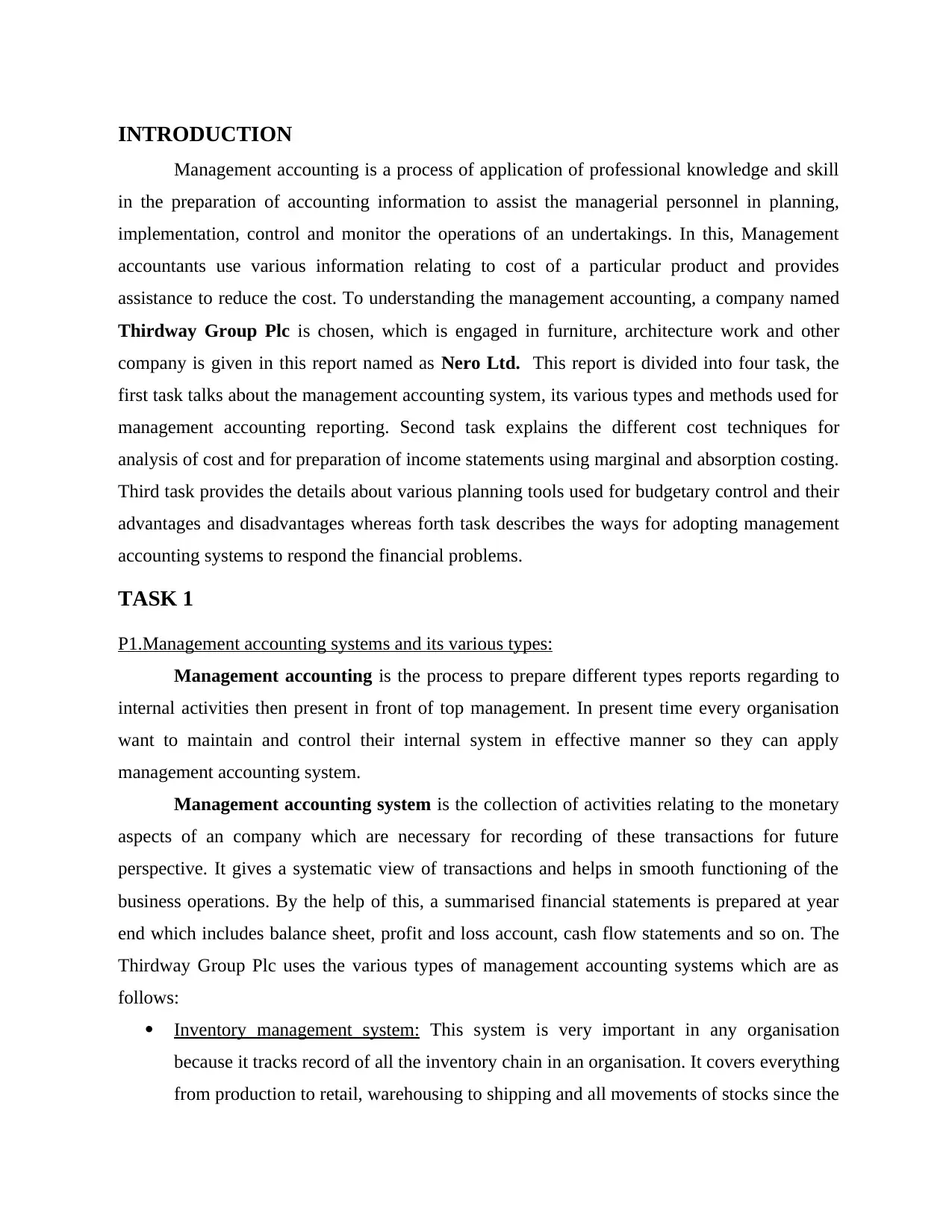
INTRODUCTION
Management accounting is a process of application of professional knowledge and skill
in the preparation of accounting information to assist the managerial personnel in planning,
implementation, control and monitor the operations of an undertakings. In this, Management
accountants use various information relating to cost of a particular product and provides
assistance to reduce the cost. To understanding the management accounting, a company named
Thirdway Group Plc is chosen, which is engaged in furniture, architecture work and other
company is given in this report named as Nero Ltd. This report is divided into four task, the
first task talks about the management accounting system, its various types and methods used for
management accounting reporting. Second task explains the different cost techniques for
analysis of cost and for preparation of income statements using marginal and absorption costing.
Third task provides the details about various planning tools used for budgetary control and their
advantages and disadvantages whereas forth task describes the ways for adopting management
accounting systems to respond the financial problems.
TASK 1
P1.Management accounting systems and its various types:
Management accounting is the process to prepare different types reports regarding to
internal activities then present in front of top management. In present time every organisation
want to maintain and control their internal system in effective manner so they can apply
management accounting system.
Management accounting system is the collection of activities relating to the monetary
aspects of an company which are necessary for recording of these transactions for future
perspective. It gives a systematic view of transactions and helps in smooth functioning of the
business operations. By the help of this, a summarised financial statements is prepared at year
end which includes balance sheet, profit and loss account, cash flow statements and so on. The
Thirdway Group Plc uses the various types of management accounting systems which are as
follows:
Inventory management system: This system is very important in any organisation
because it tracks record of all the inventory chain in an organisation. It covers everything
from production to retail, warehousing to shipping and all movements of stocks since the
Management accounting is a process of application of professional knowledge and skill
in the preparation of accounting information to assist the managerial personnel in planning,
implementation, control and monitor the operations of an undertakings. In this, Management
accountants use various information relating to cost of a particular product and provides
assistance to reduce the cost. To understanding the management accounting, a company named
Thirdway Group Plc is chosen, which is engaged in furniture, architecture work and other
company is given in this report named as Nero Ltd. This report is divided into four task, the
first task talks about the management accounting system, its various types and methods used for
management accounting reporting. Second task explains the different cost techniques for
analysis of cost and for preparation of income statements using marginal and absorption costing.
Third task provides the details about various planning tools used for budgetary control and their
advantages and disadvantages whereas forth task describes the ways for adopting management
accounting systems to respond the financial problems.
TASK 1
P1.Management accounting systems and its various types:
Management accounting is the process to prepare different types reports regarding to
internal activities then present in front of top management. In present time every organisation
want to maintain and control their internal system in effective manner so they can apply
management accounting system.
Management accounting system is the collection of activities relating to the monetary
aspects of an company which are necessary for recording of these transactions for future
perspective. It gives a systematic view of transactions and helps in smooth functioning of the
business operations. By the help of this, a summarised financial statements is prepared at year
end which includes balance sheet, profit and loss account, cash flow statements and so on. The
Thirdway Group Plc uses the various types of management accounting systems which are as
follows:
Inventory management system: This system is very important in any organisation
because it tracks record of all the inventory chain in an organisation. It covers everything
from production to retail, warehousing to shipping and all movements of stocks since the
⊘ This is a preview!⊘
Do you want full access?
Subscribe today to unlock all pages.

Trusted by 1+ million students worldwide
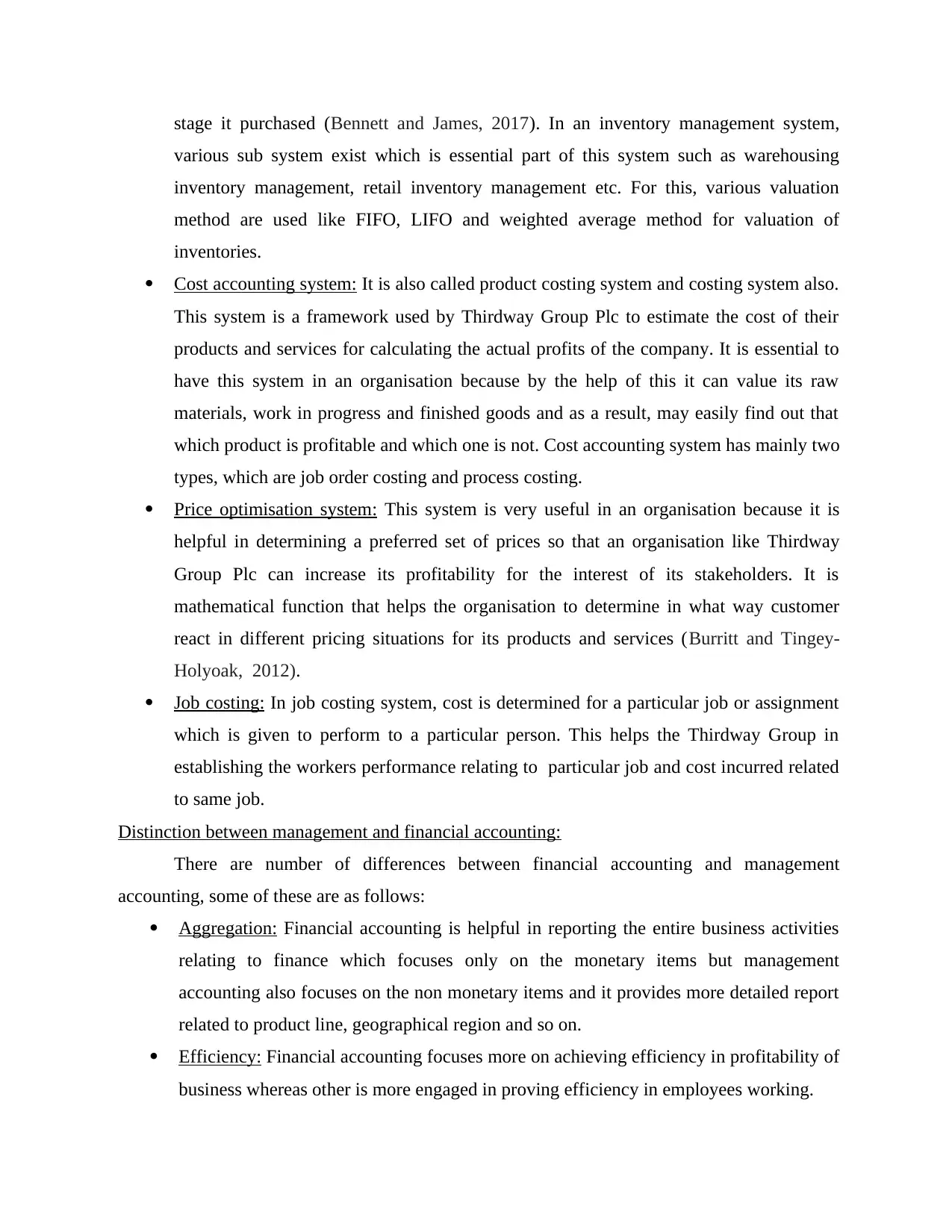
stage it purchased (Bennett and James, 2017). In an inventory management system,
various sub system exist which is essential part of this system such as warehousing
inventory management, retail inventory management etc. For this, various valuation
method are used like FIFO, LIFO and weighted average method for valuation of
inventories.
Cost accounting system: It is also called product costing system and costing system also.
This system is a framework used by Thirdway Group Plc to estimate the cost of their
products and services for calculating the actual profits of the company. It is essential to
have this system in an organisation because by the help of this it can value its raw
materials, work in progress and finished goods and as a result, may easily find out that
which product is profitable and which one is not. Cost accounting system has mainly two
types, which are job order costing and process costing.
Price optimisation system: This system is very useful in an organisation because it is
helpful in determining a preferred set of prices so that an organisation like Thirdway
Group Plc can increase its profitability for the interest of its stakeholders. It is
mathematical function that helps the organisation to determine in what way customer
react in different pricing situations for its products and services (Burritt and Tingey-
Holyoak, 2012).
Job costing: In job costing system, cost is determined for a particular job or assignment
which is given to perform to a particular person. This helps the Thirdway Group in
establishing the workers performance relating to particular job and cost incurred related
to same job.
Distinction between management and financial accounting:
There are number of differences between financial accounting and management
accounting, some of these are as follows:
Aggregation: Financial accounting is helpful in reporting the entire business activities
relating to finance which focuses only on the monetary items but management
accounting also focuses on the non monetary items and it provides more detailed report
related to product line, geographical region and so on.
Efficiency: Financial accounting focuses more on achieving efficiency in profitability of
business whereas other is more engaged in proving efficiency in employees working.
various sub system exist which is essential part of this system such as warehousing
inventory management, retail inventory management etc. For this, various valuation
method are used like FIFO, LIFO and weighted average method for valuation of
inventories.
Cost accounting system: It is also called product costing system and costing system also.
This system is a framework used by Thirdway Group Plc to estimate the cost of their
products and services for calculating the actual profits of the company. It is essential to
have this system in an organisation because by the help of this it can value its raw
materials, work in progress and finished goods and as a result, may easily find out that
which product is profitable and which one is not. Cost accounting system has mainly two
types, which are job order costing and process costing.
Price optimisation system: This system is very useful in an organisation because it is
helpful in determining a preferred set of prices so that an organisation like Thirdway
Group Plc can increase its profitability for the interest of its stakeholders. It is
mathematical function that helps the organisation to determine in what way customer
react in different pricing situations for its products and services (Burritt and Tingey-
Holyoak, 2012).
Job costing: In job costing system, cost is determined for a particular job or assignment
which is given to perform to a particular person. This helps the Thirdway Group in
establishing the workers performance relating to particular job and cost incurred related
to same job.
Distinction between management and financial accounting:
There are number of differences between financial accounting and management
accounting, some of these are as follows:
Aggregation: Financial accounting is helpful in reporting the entire business activities
relating to finance which focuses only on the monetary items but management
accounting also focuses on the non monetary items and it provides more detailed report
related to product line, geographical region and so on.
Efficiency: Financial accounting focuses more on achieving efficiency in profitability of
business whereas other is more engaged in proving efficiency in employees working.
Paraphrase This Document
Need a fresh take? Get an instant paraphrase of this document with our AI Paraphraser
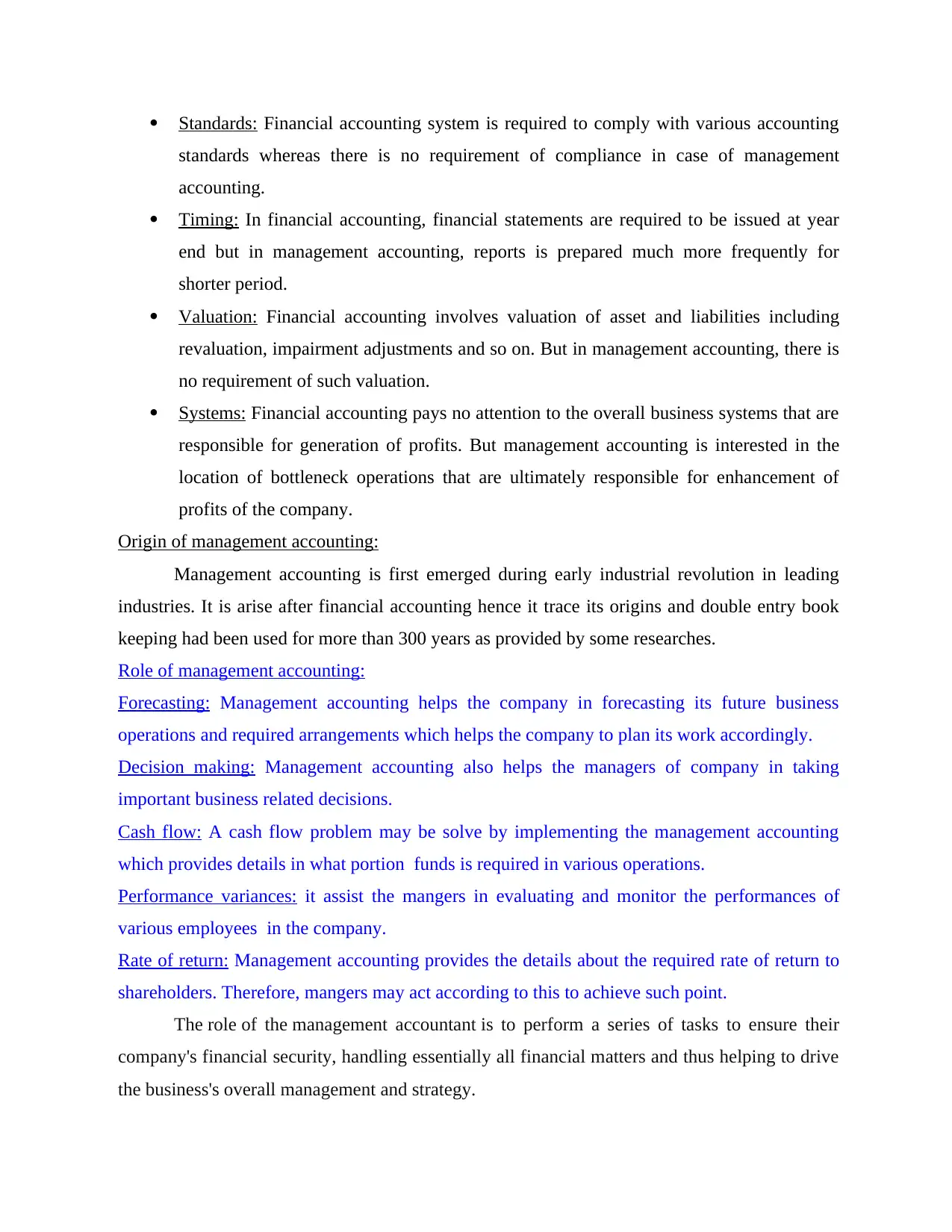
Standards: Financial accounting system is required to comply with various accounting
standards whereas there is no requirement of compliance in case of management
accounting.
Timing: In financial accounting, financial statements are required to be issued at year
end but in management accounting, reports is prepared much more frequently for
shorter period.
Valuation: Financial accounting involves valuation of asset and liabilities including
revaluation, impairment adjustments and so on. But in management accounting, there is
no requirement of such valuation.
Systems: Financial accounting pays no attention to the overall business systems that are
responsible for generation of profits. But management accounting is interested in the
location of bottleneck operations that are ultimately responsible for enhancement of
profits of the company.
Origin of management accounting:
Management accounting is first emerged during early industrial revolution in leading
industries. It is arise after financial accounting hence it trace its origins and double entry book
keeping had been used for more than 300 years as provided by some researches.
Role of management accounting:
Forecasting: Management accounting helps the company in forecasting its future business
operations and required arrangements which helps the company to plan its work accordingly.
Decision making: Management accounting also helps the managers of company in taking
important business related decisions.
Cash flow: A cash flow problem may be solve by implementing the management accounting
which provides details in what portion funds is required in various operations.
Performance variances: it assist the mangers in evaluating and monitor the performances of
various employees in the company.
Rate of return: Management accounting provides the details about the required rate of return to
shareholders. Therefore, mangers may act according to this to achieve such point.
The role of the management accountant is to perform a series of tasks to ensure their
company's financial security, handling essentially all financial matters and thus helping to drive
the business's overall management and strategy.
standards whereas there is no requirement of compliance in case of management
accounting.
Timing: In financial accounting, financial statements are required to be issued at year
end but in management accounting, reports is prepared much more frequently for
shorter period.
Valuation: Financial accounting involves valuation of asset and liabilities including
revaluation, impairment adjustments and so on. But in management accounting, there is
no requirement of such valuation.
Systems: Financial accounting pays no attention to the overall business systems that are
responsible for generation of profits. But management accounting is interested in the
location of bottleneck operations that are ultimately responsible for enhancement of
profits of the company.
Origin of management accounting:
Management accounting is first emerged during early industrial revolution in leading
industries. It is arise after financial accounting hence it trace its origins and double entry book
keeping had been used for more than 300 years as provided by some researches.
Role of management accounting:
Forecasting: Management accounting helps the company in forecasting its future business
operations and required arrangements which helps the company to plan its work accordingly.
Decision making: Management accounting also helps the managers of company in taking
important business related decisions.
Cash flow: A cash flow problem may be solve by implementing the management accounting
which provides details in what portion funds is required in various operations.
Performance variances: it assist the mangers in evaluating and monitor the performances of
various employees in the company.
Rate of return: Management accounting provides the details about the required rate of return to
shareholders. Therefore, mangers may act according to this to achieve such point.
The role of the management accountant is to perform a series of tasks to ensure their
company's financial security, handling essentially all financial matters and thus helping to drive
the business's overall management and strategy.
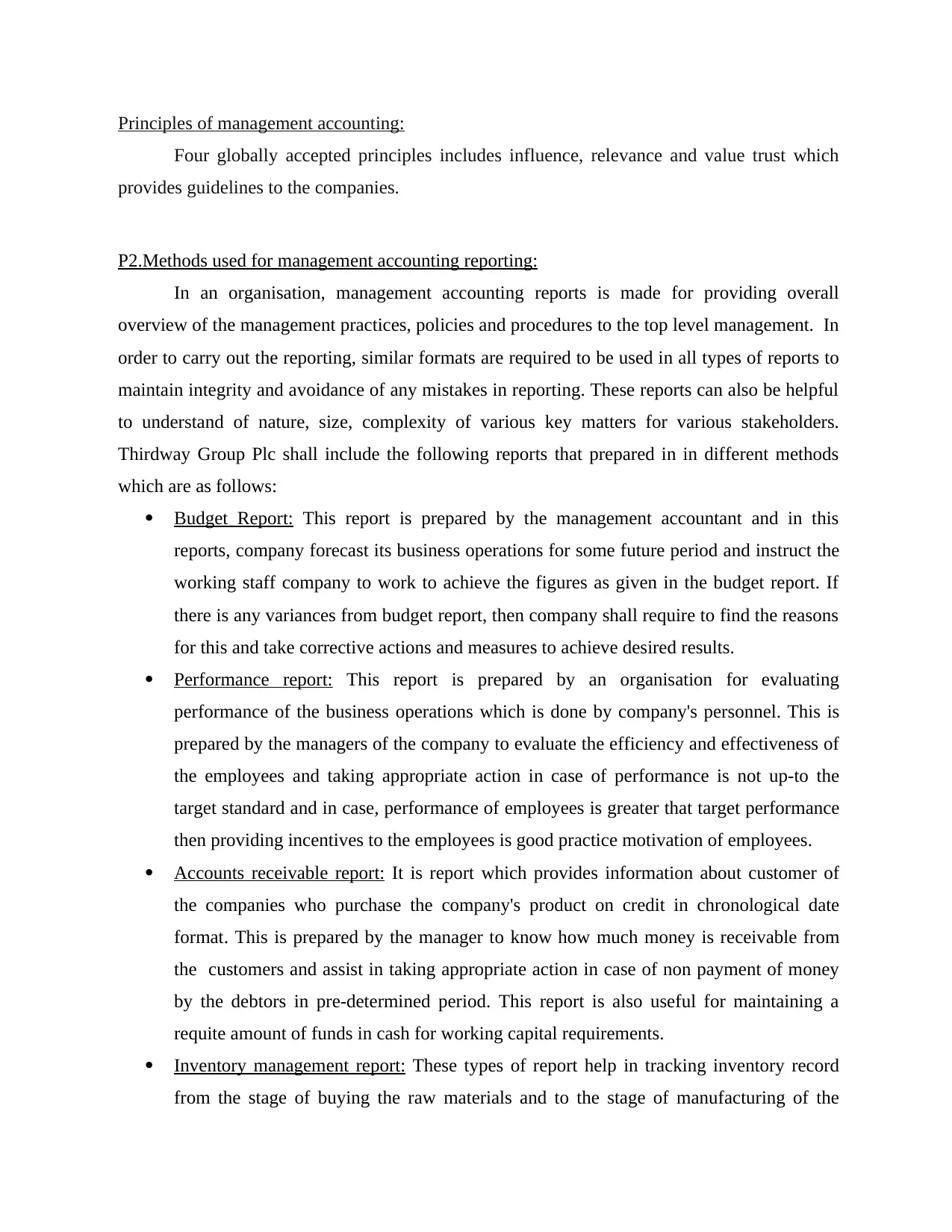
Principles of management accounting:
Four globally accepted principles includes influence, relevance and value trust which
provides guidelines to the companies.
P2.Methods used for management accounting reporting:
In an organisation, management accounting reports is made for providing overall
overview of the management practices, policies and procedures to the top level management. In
order to carry out the reporting, similar formats are required to be used in all types of reports to
maintain integrity and avoidance of any mistakes in reporting. These reports can also be helpful
to understand of nature, size, complexity of various key matters for various stakeholders.
Thirdway Group Plc shall include the following reports that prepared in in different methods
which are as follows:
Budget Report: This report is prepared by the management accountant and in this
reports, company forecast its business operations for some future period and instruct the
working staff company to work to achieve the figures as given in the budget report. If
there is any variances from budget report, then company shall require to find the reasons
for this and take corrective actions and measures to achieve desired results.
Performance report: This report is prepared by an organisation for evaluating
performance of the business operations which is done by company's personnel. This is
prepared by the managers of the company to evaluate the efficiency and effectiveness of
the employees and taking appropriate action in case of performance is not up-to the
target standard and in case, performance of employees is greater that target performance
then providing incentives to the employees is good practice motivation of employees.
Accounts receivable report: It is report which provides information about customer of
the companies who purchase the company's product on credit in chronological date
format. This is prepared by the manager to know how much money is receivable from
the customers and assist in taking appropriate action in case of non payment of money
by the debtors in pre-determined period. This report is also useful for maintaining a
requite amount of funds in cash for working capital requirements.
Inventory management report: These types of report help in tracking inventory record
from the stage of buying the raw materials and to the stage of manufacturing of the
Four globally accepted principles includes influence, relevance and value trust which
provides guidelines to the companies.
P2.Methods used for management accounting reporting:
In an organisation, management accounting reports is made for providing overall
overview of the management practices, policies and procedures to the top level management. In
order to carry out the reporting, similar formats are required to be used in all types of reports to
maintain integrity and avoidance of any mistakes in reporting. These reports can also be helpful
to understand of nature, size, complexity of various key matters for various stakeholders.
Thirdway Group Plc shall include the following reports that prepared in in different methods
which are as follows:
Budget Report: This report is prepared by the management accountant and in this
reports, company forecast its business operations for some future period and instruct the
working staff company to work to achieve the figures as given in the budget report. If
there is any variances from budget report, then company shall require to find the reasons
for this and take corrective actions and measures to achieve desired results.
Performance report: This report is prepared by an organisation for evaluating
performance of the business operations which is done by company's personnel. This is
prepared by the managers of the company to evaluate the efficiency and effectiveness of
the employees and taking appropriate action in case of performance is not up-to the
target standard and in case, performance of employees is greater that target performance
then providing incentives to the employees is good practice motivation of employees.
Accounts receivable report: It is report which provides information about customer of
the companies who purchase the company's product on credit in chronological date
format. This is prepared by the manager to know how much money is receivable from
the customers and assist in taking appropriate action in case of non payment of money
by the debtors in pre-determined period. This report is also useful for maintaining a
requite amount of funds in cash for working capital requirements.
Inventory management report: These types of report help in tracking inventory record
from the stage of buying the raw materials and to the stage of manufacturing of the
⊘ This is a preview!⊘
Do you want full access?
Subscribe today to unlock all pages.

Trusted by 1+ million students worldwide
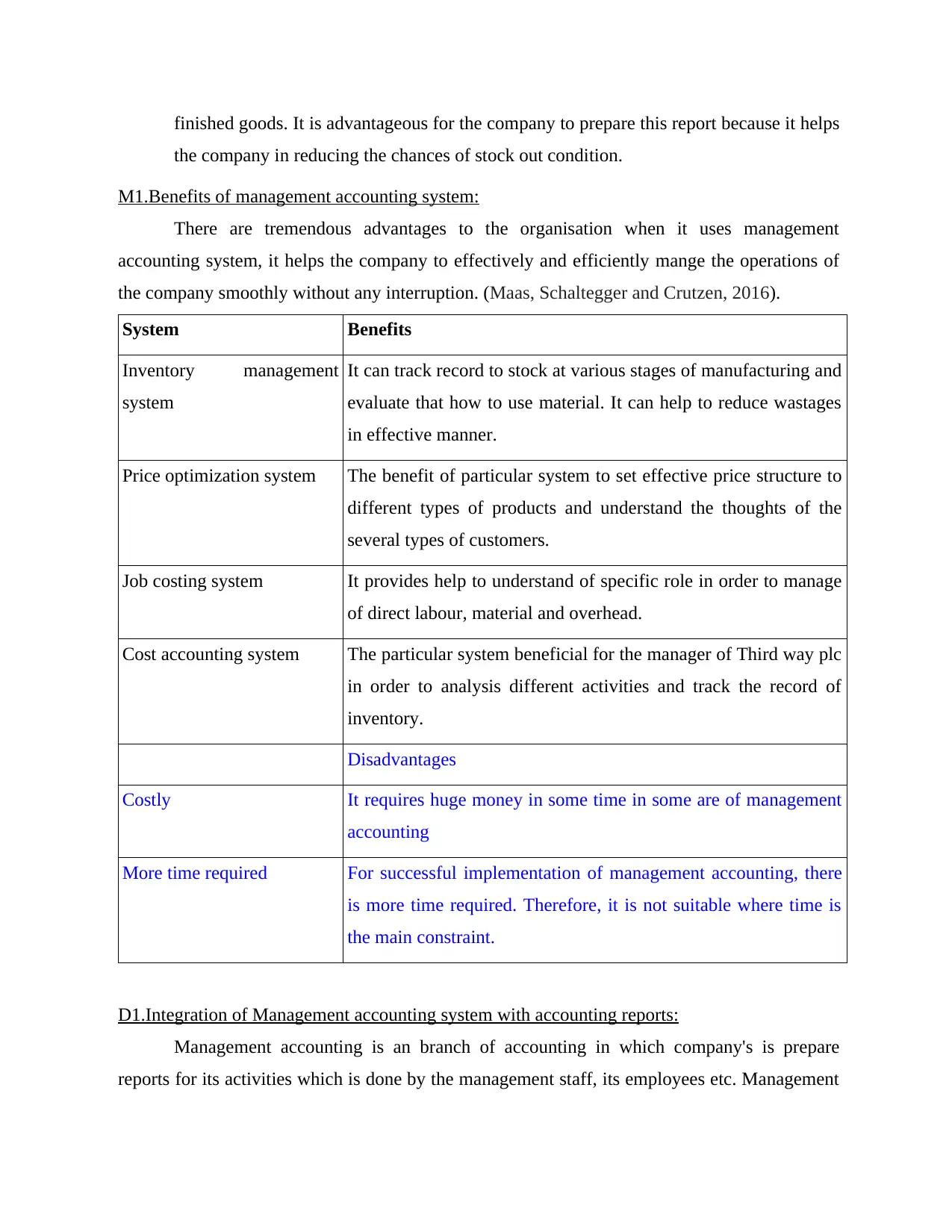
finished goods. It is advantageous for the company to prepare this report because it helps
the company in reducing the chances of stock out condition.
M1.Benefits of management accounting system:
There are tremendous advantages to the organisation when it uses management
accounting system, it helps the company to effectively and efficiently mange the operations of
the company smoothly without any interruption. (Maas, Schaltegger and Crutzen, 2016).
System Benefits
Inventory management
system
It can track record to stock at various stages of manufacturing and
evaluate that how to use material. It can help to reduce wastages
in effective manner.
Price optimization system The benefit of particular system to set effective price structure to
different types of products and understand the thoughts of the
several types of customers.
Job costing system It provides help to understand of specific role in order to manage
of direct labour, material and overhead.
Cost accounting system The particular system beneficial for the manager of Third way plc
in order to analysis different activities and track the record of
inventory.
Disadvantages
Costly It requires huge money in some time in some are of management
accounting
More time required For successful implementation of management accounting, there
is more time required. Therefore, it is not suitable where time is
the main constraint.
D1.Integration of Management accounting system with accounting reports:
Management accounting is an branch of accounting in which company's is prepare
reports for its activities which is done by the management staff, its employees etc. Management
the company in reducing the chances of stock out condition.
M1.Benefits of management accounting system:
There are tremendous advantages to the organisation when it uses management
accounting system, it helps the company to effectively and efficiently mange the operations of
the company smoothly without any interruption. (Maas, Schaltegger and Crutzen, 2016).
System Benefits
Inventory management
system
It can track record to stock at various stages of manufacturing and
evaluate that how to use material. It can help to reduce wastages
in effective manner.
Price optimization system The benefit of particular system to set effective price structure to
different types of products and understand the thoughts of the
several types of customers.
Job costing system It provides help to understand of specific role in order to manage
of direct labour, material and overhead.
Cost accounting system The particular system beneficial for the manager of Third way plc
in order to analysis different activities and track the record of
inventory.
Disadvantages
Costly It requires huge money in some time in some are of management
accounting
More time required For successful implementation of management accounting, there
is more time required. Therefore, it is not suitable where time is
the main constraint.
D1.Integration of Management accounting system with accounting reports:
Management accounting is an branch of accounting in which company's is prepare
reports for its activities which is done by the management staff, its employees etc. Management
Paraphrase This Document
Need a fresh take? Get an instant paraphrase of this document with our AI Paraphraser
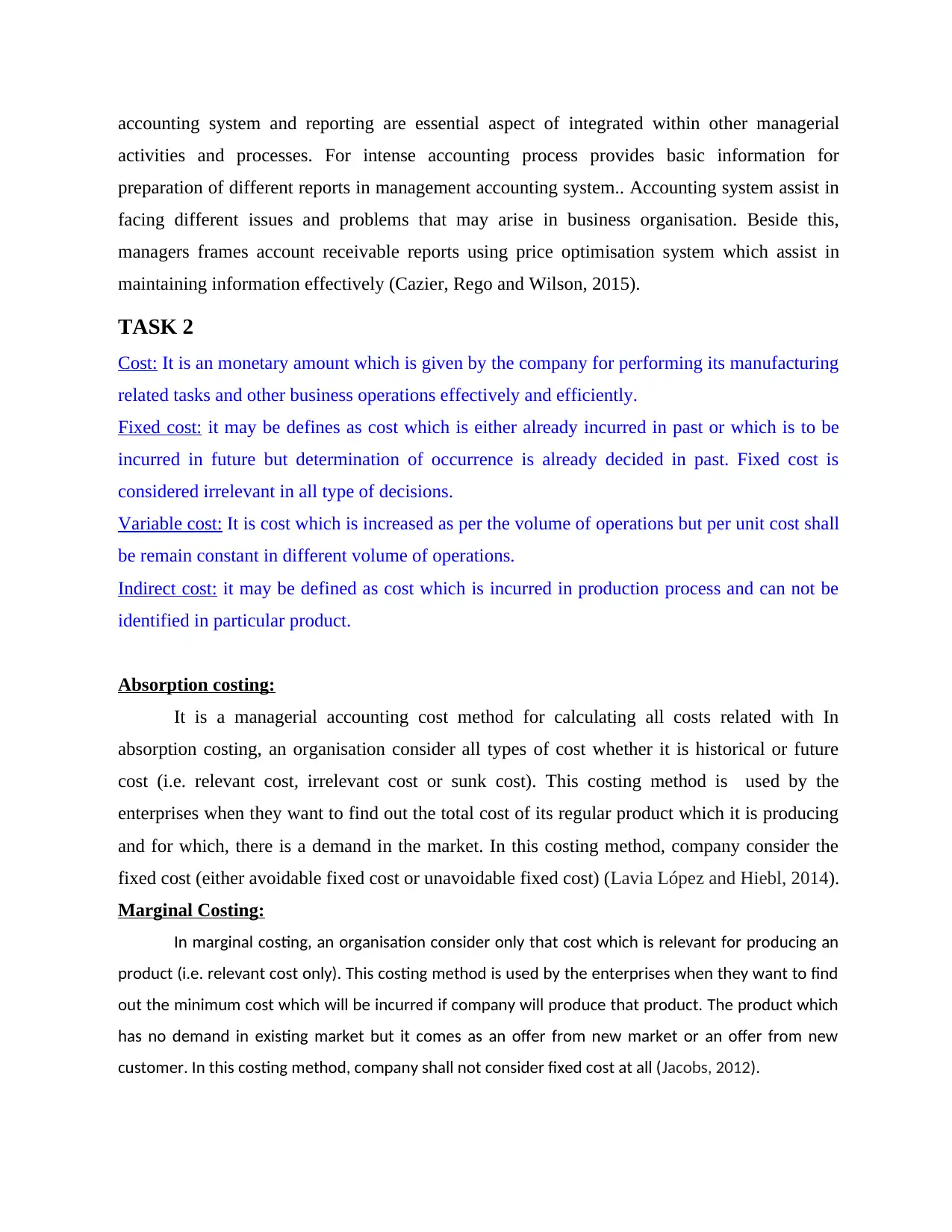
accounting system and reporting are essential aspect of integrated within other managerial
activities and processes. For intense accounting process provides basic information for
preparation of different reports in management accounting system.. Accounting system assist in
facing different issues and problems that may arise in business organisation. Beside this,
managers frames account receivable reports using price optimisation system which assist in
maintaining information effectively (Cazier, Rego and Wilson, 2015).
TASK 2
Cost: It is an monetary amount which is given by the company for performing its manufacturing
related tasks and other business operations effectively and efficiently.
Fixed cost: it may be defines as cost which is either already incurred in past or which is to be
incurred in future but determination of occurrence is already decided in past. Fixed cost is
considered irrelevant in all type of decisions.
Variable cost: It is cost which is increased as per the volume of operations but per unit cost shall
be remain constant in different volume of operations.
Indirect cost: it may be defined as cost which is incurred in production process and can not be
identified in particular product.
Absorption costing:
It is a managerial accounting cost method for calculating all costs related with In
absorption costing, an organisation consider all types of cost whether it is historical or future
cost (i.e. relevant cost, irrelevant cost or sunk cost). This costing method is used by the
enterprises when they want to find out the total cost of its regular product which it is producing
and for which, there is a demand in the market. In this costing method, company consider the
fixed cost (either avoidable fixed cost or unavoidable fixed cost) (Lavia López and Hiebl, 2014).
Marginal Costing:
In marginal costing, an organisation consider only that cost which is relevant for producing an
product (i.e. relevant cost only). This costing method is used by the enterprises when they want to find
out the minimum cost which will be incurred if company will produce that product. The product which
has no demand in existing market but it comes as an offer from new market or an offer from new
customer. In this costing method, company shall not consider fixed cost at all (Jacobs, 2012).
activities and processes. For intense accounting process provides basic information for
preparation of different reports in management accounting system.. Accounting system assist in
facing different issues and problems that may arise in business organisation. Beside this,
managers frames account receivable reports using price optimisation system which assist in
maintaining information effectively (Cazier, Rego and Wilson, 2015).
TASK 2
Cost: It is an monetary amount which is given by the company for performing its manufacturing
related tasks and other business operations effectively and efficiently.
Fixed cost: it may be defines as cost which is either already incurred in past or which is to be
incurred in future but determination of occurrence is already decided in past. Fixed cost is
considered irrelevant in all type of decisions.
Variable cost: It is cost which is increased as per the volume of operations but per unit cost shall
be remain constant in different volume of operations.
Indirect cost: it may be defined as cost which is incurred in production process and can not be
identified in particular product.
Absorption costing:
It is a managerial accounting cost method for calculating all costs related with In
absorption costing, an organisation consider all types of cost whether it is historical or future
cost (i.e. relevant cost, irrelevant cost or sunk cost). This costing method is used by the
enterprises when they want to find out the total cost of its regular product which it is producing
and for which, there is a demand in the market. In this costing method, company consider the
fixed cost (either avoidable fixed cost or unavoidable fixed cost) (Lavia López and Hiebl, 2014).
Marginal Costing:
In marginal costing, an organisation consider only that cost which is relevant for producing an
product (i.e. relevant cost only). This costing method is used by the enterprises when they want to find
out the minimum cost which will be incurred if company will produce that product. The product which
has no demand in existing market but it comes as an offer from new market or an offer from new
customer. In this costing method, company shall not consider fixed cost at all (Jacobs, 2012).
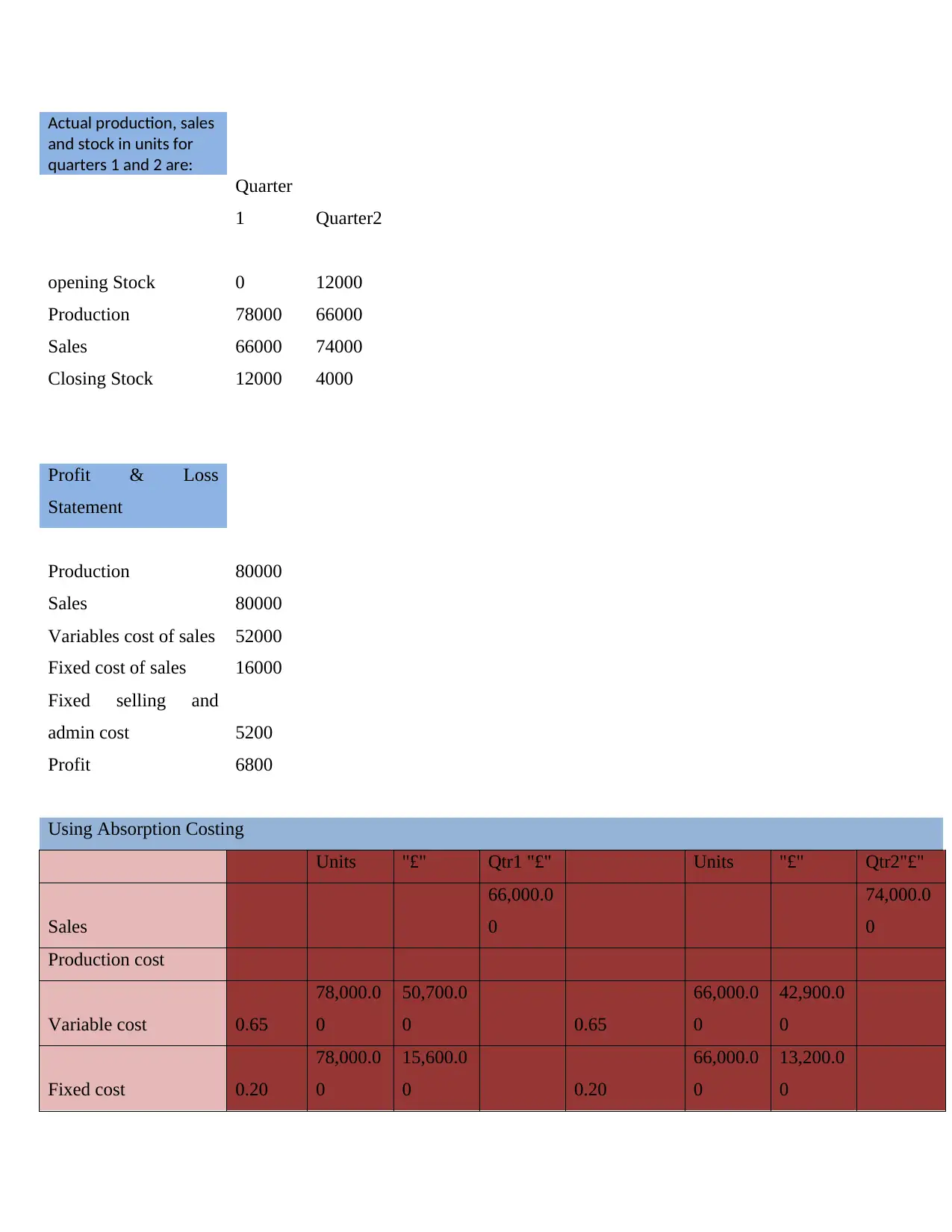
Actual production, sales
and stock in units for
quarters 1 and 2 are:
Quarter
1 Quarter2
opening Stock 0 12000
Production 78000 66000
Sales 66000 74000
Closing Stock 12000 4000
Profit & Loss
Statement
Production 80000
Sales 80000
Variables cost of sales 52000
Fixed cost of sales 16000
Fixed selling and
admin cost 5200
Profit 6800
Using Absorption Costing
Units "£" Qtr1 "£" Units "£" Qtr2"£"
Sales
66,000.0
0
74,000.0
0
Production cost
Variable cost 0.65
78,000.0
0
50,700.0
0 0.65
66,000.0
0
42,900.0
0
Fixed cost 0.20
78,000.0
0
15,600.0
0 0.20
66,000.0
0
13,200.0
0
and stock in units for
quarters 1 and 2 are:
Quarter
1 Quarter2
opening Stock 0 12000
Production 78000 66000
Sales 66000 74000
Closing Stock 12000 4000
Profit & Loss
Statement
Production 80000
Sales 80000
Variables cost of sales 52000
Fixed cost of sales 16000
Fixed selling and
admin cost 5200
Profit 6800
Using Absorption Costing
Units "£" Qtr1 "£" Units "£" Qtr2"£"
Sales
66,000.0
0
74,000.0
0
Production cost
Variable cost 0.65
78,000.0
0
50,700.0
0 0.65
66,000.0
0
42,900.0
0
Fixed cost 0.20
78,000.0
0
15,600.0
0 0.20
66,000.0
0
13,200.0
0
⊘ This is a preview!⊘
Do you want full access?
Subscribe today to unlock all pages.

Trusted by 1+ million students worldwide
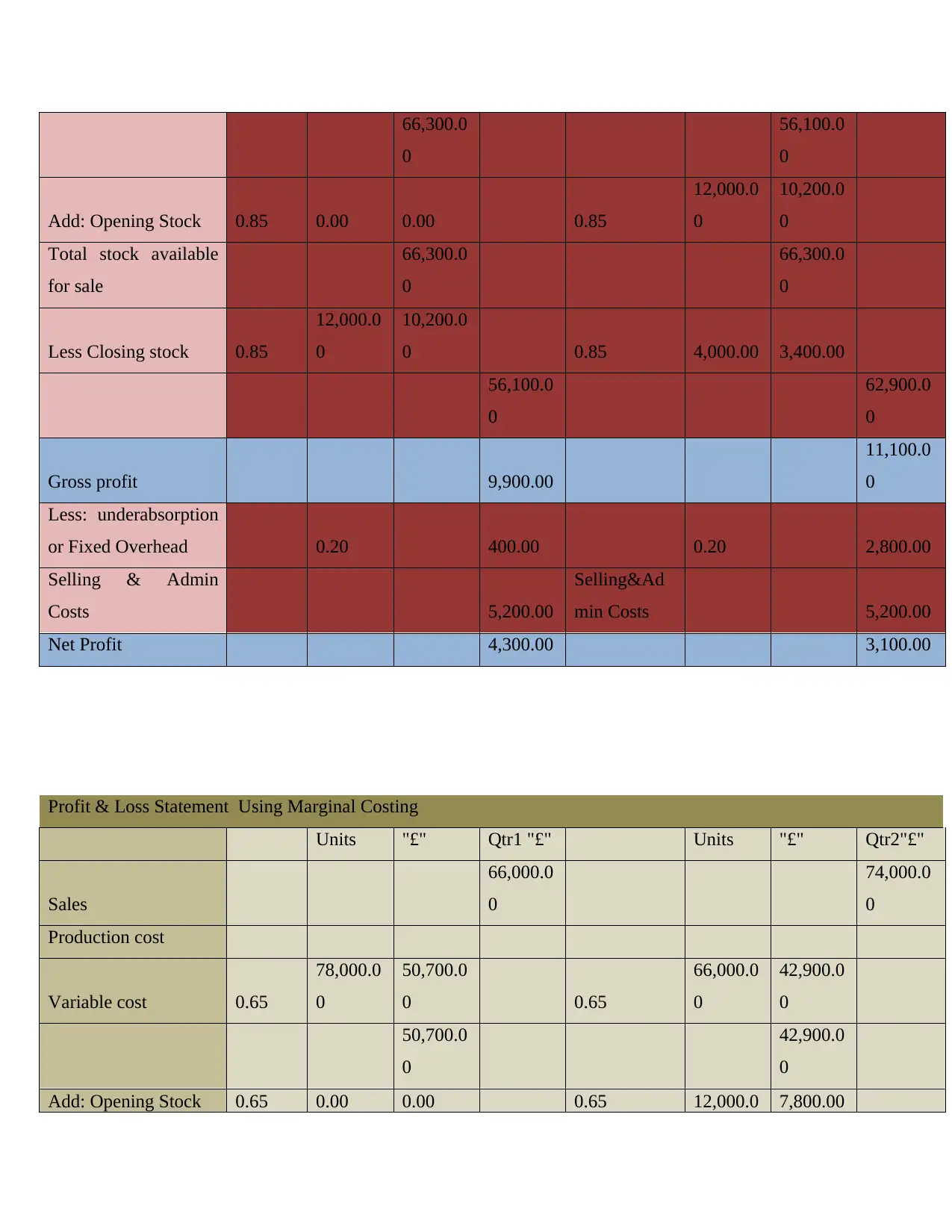
66,300.0
0
56,100.0
0
Add: Opening Stock 0.85 0.00 0.00 0.85
12,000.0
0
10,200.0
0
Total stock available
for sale
66,300.0
0
66,300.0
0
Less Closing stock 0.85
12,000.0
0
10,200.0
0 0.85 4,000.00 3,400.00
56,100.0
0
62,900.0
0
Gross profit 9,900.00
11,100.0
0
Less: underabsorption
or Fixed Overhead 0.20 400.00 0.20 2,800.00
Selling & Admin
Costs 5,200.00
Selling&Ad
min Costs 5,200.00
Net Profit 4,300.00 3,100.00
Profit & Loss Statement Using Marginal Costing
Units "£" Qtr1 "£" Units "£" Qtr2"£"
Sales
66,000.0
0
74,000.0
0
Production cost
Variable cost 0.65
78,000.0
0
50,700.0
0 0.65
66,000.0
0
42,900.0
0
50,700.0
0
42,900.0
0
Add: Opening Stock 0.65 0.00 0.00 0.65 12,000.0 7,800.00
0
56,100.0
0
Add: Opening Stock 0.85 0.00 0.00 0.85
12,000.0
0
10,200.0
0
Total stock available
for sale
66,300.0
0
66,300.0
0
Less Closing stock 0.85
12,000.0
0
10,200.0
0 0.85 4,000.00 3,400.00
56,100.0
0
62,900.0
0
Gross profit 9,900.00
11,100.0
0
Less: underabsorption
or Fixed Overhead 0.20 400.00 0.20 2,800.00
Selling & Admin
Costs 5,200.00
Selling&Ad
min Costs 5,200.00
Net Profit 4,300.00 3,100.00
Profit & Loss Statement Using Marginal Costing
Units "£" Qtr1 "£" Units "£" Qtr2"£"
Sales
66,000.0
0
74,000.0
0
Production cost
Variable cost 0.65
78,000.0
0
50,700.0
0 0.65
66,000.0
0
42,900.0
0
50,700.0
0
42,900.0
0
Add: Opening Stock 0.65 0.00 0.00 0.65 12,000.0 7,800.00
Paraphrase This Document
Need a fresh take? Get an instant paraphrase of this document with our AI Paraphraser
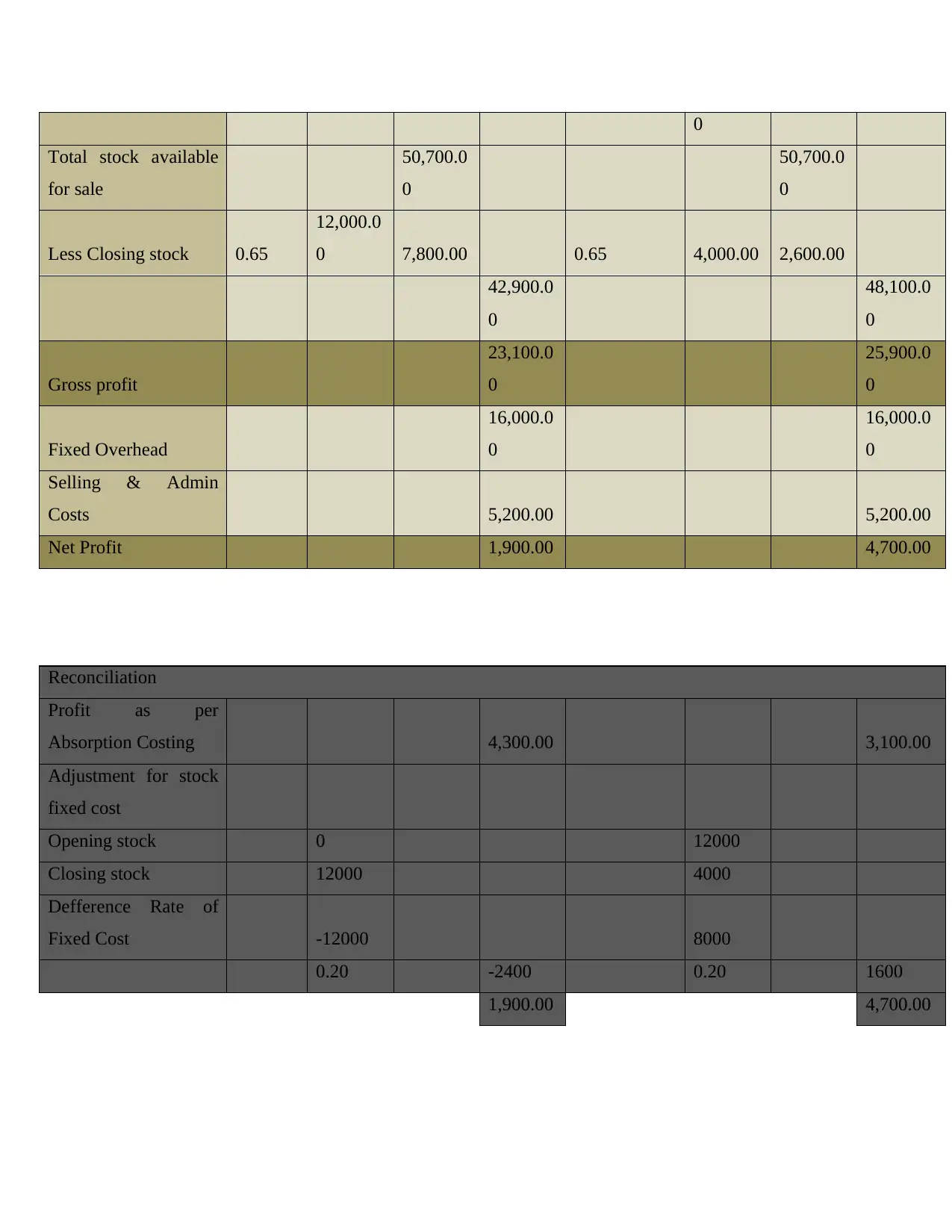
0
Total stock available
for sale
50,700.0
0
50,700.0
0
Less Closing stock 0.65
12,000.0
0 7,800.00 0.65 4,000.00 2,600.00
42,900.0
0
48,100.0
0
Gross profit
23,100.0
0
25,900.0
0
Fixed Overhead
16,000.0
0
16,000.0
0
Selling & Admin
Costs 5,200.00 5,200.00
Net Profit 1,900.00 4,700.00
Reconciliation
Profit as per
Absorption Costing 4,300.00 3,100.00
Adjustment for stock
fixed cost
Opening stock 0 12000
Closing stock 12000 4000
Defference Rate of
Fixed Cost -12000 8000
0.20 -2400 0.20 1600
1,900.00 4,700.00
Total stock available
for sale
50,700.0
0
50,700.0
0
Less Closing stock 0.65
12,000.0
0 7,800.00 0.65 4,000.00 2,600.00
42,900.0
0
48,100.0
0
Gross profit
23,100.0
0
25,900.0
0
Fixed Overhead
16,000.0
0
16,000.0
0
Selling & Admin
Costs 5,200.00 5,200.00
Net Profit 1,900.00 4,700.00
Reconciliation
Profit as per
Absorption Costing 4,300.00 3,100.00
Adjustment for stock
fixed cost
Opening stock 0 12000
Closing stock 12000 4000
Defference Rate of
Fixed Cost -12000 8000
0.20 -2400 0.20 1600
1,900.00 4,700.00
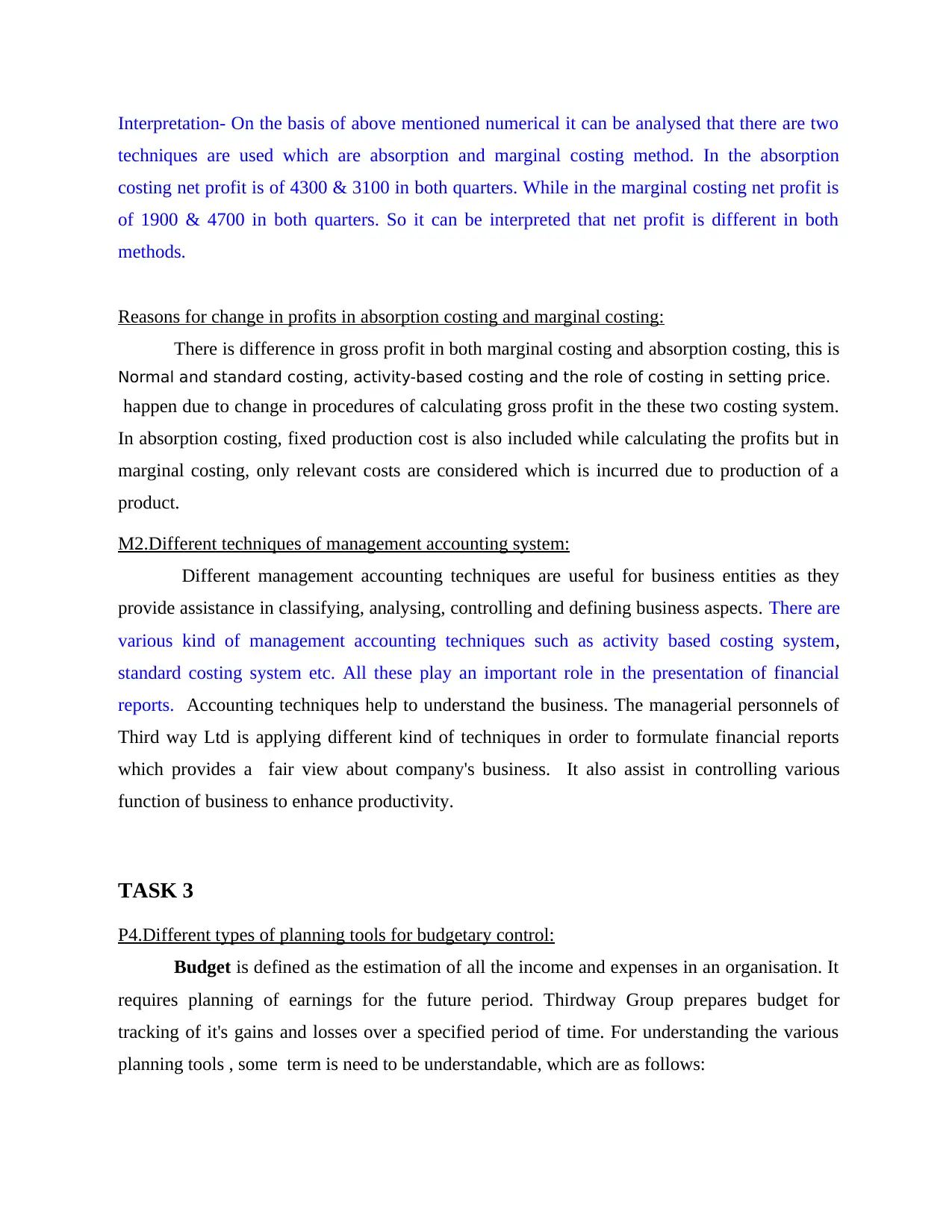
Interpretation- On the basis of above mentioned numerical it can be analysed that there are two
techniques are used which are absorption and marginal costing method. In the absorption
costing net profit is of 4300 & 3100 in both quarters. While in the marginal costing net profit is
of 1900 & 4700 in both quarters. So it can be interpreted that net profit is different in both
methods.
Reasons for change in profits in absorption costing and marginal costing:
There is difference in gross profit in both marginal costing and absorption costing, this is
Normal and standard costing, activity-based costing and the role of costing in setting price.
happen due to change in procedures of calculating gross profit in the these two costing system.
In absorption costing, fixed production cost is also included while calculating the profits but in
marginal costing, only relevant costs are considered which is incurred due to production of a
product.
M2.Different techniques of management accounting system:
Different management accounting techniques are useful for business entities as they
provide assistance in classifying, analysing, controlling and defining business aspects. There are
various kind of management accounting techniques such as activity based costing system,
standard costing system etc. All these play an important role in the presentation of financial
reports. Accounting techniques help to understand the business. The managerial personnels of
Third way Ltd is applying different kind of techniques in order to formulate financial reports
which provides a fair view about company's business. It also assist in controlling various
function of business to enhance productivity.
TASK 3
P4.Different types of planning tools for budgetary control:
Budget is defined as the estimation of all the income and expenses in an organisation. It
requires planning of earnings for the future period. Thirdway Group prepares budget for
tracking of it's gains and losses over a specified period of time. For understanding the various
planning tools , some term is need to be understandable, which are as follows:
techniques are used which are absorption and marginal costing method. In the absorption
costing net profit is of 4300 & 3100 in both quarters. While in the marginal costing net profit is
of 1900 & 4700 in both quarters. So it can be interpreted that net profit is different in both
methods.
Reasons for change in profits in absorption costing and marginal costing:
There is difference in gross profit in both marginal costing and absorption costing, this is
Normal and standard costing, activity-based costing and the role of costing in setting price.
happen due to change in procedures of calculating gross profit in the these two costing system.
In absorption costing, fixed production cost is also included while calculating the profits but in
marginal costing, only relevant costs are considered which is incurred due to production of a
product.
M2.Different techniques of management accounting system:
Different management accounting techniques are useful for business entities as they
provide assistance in classifying, analysing, controlling and defining business aspects. There are
various kind of management accounting techniques such as activity based costing system,
standard costing system etc. All these play an important role in the presentation of financial
reports. Accounting techniques help to understand the business. The managerial personnels of
Third way Ltd is applying different kind of techniques in order to formulate financial reports
which provides a fair view about company's business. It also assist in controlling various
function of business to enhance productivity.
TASK 3
P4.Different types of planning tools for budgetary control:
Budget is defined as the estimation of all the income and expenses in an organisation. It
requires planning of earnings for the future period. Thirdway Group prepares budget for
tracking of it's gains and losses over a specified period of time. For understanding the various
planning tools , some term is need to be understandable, which are as follows:
⊘ This is a preview!⊘
Do you want full access?
Subscribe today to unlock all pages.

Trusted by 1+ million students worldwide
1 out of 17
Related Documents
Your All-in-One AI-Powered Toolkit for Academic Success.
+13062052269
info@desklib.com
Available 24*7 on WhatsApp / Email
![[object Object]](/_next/static/media/star-bottom.7253800d.svg)
Unlock your academic potential
Copyright © 2020–2026 A2Z Services. All Rights Reserved. Developed and managed by ZUCOL.





